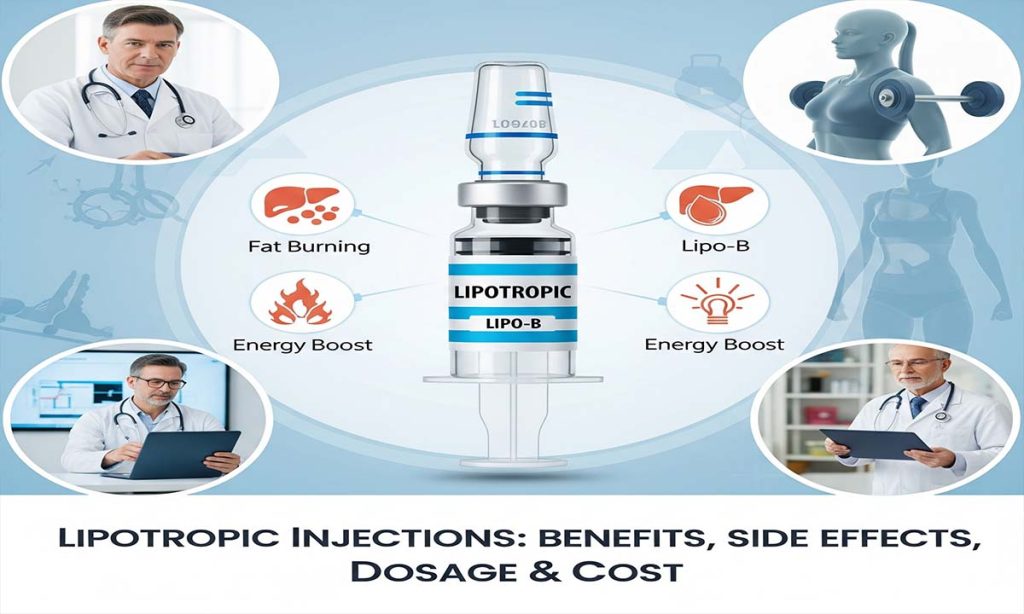Lipotropic injections are specialized blends of vitamins, amino acids, and other nutrients that some weight-loss clinics promote to help burn fat and boost energy. These injections typically contain “lipotropic” compounds (such as methionine, inositol, choline, and vitamin B12) that are thought to support fat metabolism in the liver. Clinics often market them as a complement to a healthy diet and exercise regimen; for example, Utah Trim Clinic notes that lipotropic shots “support the breakdown of fats in the liver and enhance your body’s metabolic processes”. It’s important to remember that research is limited – clinical trials of lipotropic injections are scarce – and they should never replace fundamental diet and exercise habits. This guide reviews their potential benefits, side effects, dosage and cost so you can make an informed decision.

Table of Contents
How Lipotropic Injections Work
Lipotropic shots are often called “MIC-B12” or “Lipo-C” injections, because they typically combine methionine (M), inositol (I), choline (C) and vitamin B12 in a single dose. The mixture is injected (usually subcutaneously or intramuscularly) so that nutrients go directly into the bloodstream. The idea is that these nutrients work together to enhance the body’s natural fat-burning processes. For example, the IvyRx guide explains that these compounds “support liver function, speeding toxin clearance and enhancing fat processing,” while also “boost(ing) cellular energy, turning stored fat into usable fuel”. In other words, lipotropes are supposed to help the liver break down stored fat and convert it into energy more efficiently. (In practice, diet and exercise are still needed for real weight loss – lipotropic injections are a supplemental boost.)
The main ingredients have some known roles: methionine, inositol and choline help the liver process fats; vitamin B12 supports energy and metabolism. While single nutrients like B12 are essential for health, experts note that high doses above normal levels have not been proven to speed fat loss on their own. Some research suggests components like L-carnitine (often added to injections) may aid weight loss when combined with diet/exercise. Similarly, a study found that adding myo-inositol to a healthy diet helped overweight women (with PCOS) lose fat faster. However, no study has definitively tested a complete lipotropic injection cocktail, so these shots remain an emerging practice lipotropic injections
Benefits of Lipotropic Injections
People seek lipotropic injections mainly for weight-loss support. Proponents claim several benefits, which typically include:
- Enhanced fat metabolism: By supplying lipotropic nutrients, these shots target fat breakdown especially in the liver, potentially accelerating weight loss efforts. Clinics often cite “accelerated fat loss” as a key benefit. (For example, IvyRx notes lipotropes “enhance your body’s ability to reduce fat”.)
- Increased energy: Vitamin B12 is well-known for reducing fatigue. Many users report a surge in energy after shots, which can help power workouts and daily activities. Boosted stamina means you may exercise more intensely or consistently.
- Improved liver function: Choline and methionine are essential for healthy liver metabolism. A well-functioning liver processes fat and toxins better, supporting overall wellness. Utah Trim Clinic explains that lipotropes “detoxify the liver” and improve its ability to use fat as fuel.
- Appetite control and mood: Some people find that after shots their hunger cravings decrease, making it easier to stick to a calorie-controlled diet. Ingredients like inositol and B vitamins can also support neurotransmitter balance, potentially improving mood and focus during a weight-loss program.
These points summarize the reported advantages. Clinical evidence is still emerging, but early indicators suggest modest benefits when combined with healthy habits. For example, an IvyRx overview notes typical one-month outcomes of lipotropic therapy are 2–5 pounds of fat loss, increased energy, and improved body composition, especially in people who also eat well and exercise. Similarly, a Maryland weight-loss clinic report found that, on average, patients lost about 2–4 pounds in a month of regular lipotropic injections alongside a healthy regimen. Overall, users tend to see best results when shots are part of a holistic program – diet, workouts, hydration and rest – rather than a stand-alone “magic” solution.
Lipotropic Injection Dosage and Schedule
There is no single standard dosage for lipotropic injections; protocols vary by clinic and formulation. Dosage depends on which nutrients are included and a patient’s needs. Some providers start with 1 injection per week, while others recommend 2–3 weekly for faster results. IvyRx reports that most patients take 2–4 injections per week (about 8–16 shots per month) in a typical regimen. At-home injection programs often bundle a monthly supply; for instance, one service offers 8–12 injections per month for about $179, roughly 2–3 times per week.
Doctors typically adjust frequency based on response. In one small trial exploring B12’s effect on weight, participants received 1,000 micrograms of B12 intramuscularly (a fairly high dose) to check for fat-loss benefits. However, there is no evidence-backed formula dictating dose or schedule. Some clinics use stronger B12 amounts plus a full MIC combo; others give lighter doses. The Medical News Today review confirms there’s “no scientific data to back any dosage claims that weight loss clinics make,” and advises individualized plans.
In practice, a typical protocol might be: one lipotropic shot each week initially, then increase to 2 per week if tolerated. The shot is usually given in the arm, thigh or buttock. Patients and clinics often aim for consistency – missing doses can slow any potential gains. Key point: always follow the guidelines of your healthcare provider or clinic. Only licensed professionals should administer injections to ensure safety and correct technique.
Side Effects and Safety
Lipotropic injections are generally well-tolerated, but like any treatment, they carry potential side effects and risks. It’s crucial to discuss these with a doctor before starting. Common side effects are usually mild and may include:
- Injection site reactions: Slight pain, redness, swelling or bruising where the shot is given. This is normal for any injection.
- Gastrointestinal upset: Some people experience mild nausea, loose stools or diarrhea after a shot. These issues tend to be temporary and usually resolve within a day. Staying hydrated and having a light snack beforehand can help.
- Headache or dizziness: Rarely, B vitamins or methionine can trigger headaches in sensitive individuals. If severe, stop injections and consult a doctor.
- Allergic reaction: True allergic reactions are uncommon but possible. If you have known allergies to any components (e.g. B12, yeast-free vitamin B12 is usually used, but methionine or other additives may cause issues), inform your provider. Symptoms like itching, rash, or breathing difficulty require immediate medical attention.
Importantly, the overall safety of lipotropic injections has not been well-studied in clinical trials. Most information on risks comes from user anecdotes and case reports. Medical News Today emphasizes choosing a reputable clinic with licensed medical staff, because some walk-in weight-loss centers might offer these shots without a doctor on-site. Before starting, always disclose your full medical history: some ingredients could interact with medications or conditions (for example, large doses of certain B vitamins can affect blood clotting or electrolyte balance).
Another “risk” to be aware of is false expectations. Since lipotropic shots are not a guaranteed cure, relying on them alone is a mistake. MNT points out that if injections do nothing, patients may waste time and money while actual fat loss stalls. You should adopt them only as a small part of an overall plan. As one expert notes, lipotropic injections do not substitute for a healthy diet and exercise.
Expected Results and Before/After Transformations
Many people wonder, “What will I actually see after a month of lipotropic injections?” Based on clinic reports and user testimonials, the answer is usually gradual, modest changes – not overnight miracles. With consistent weekly shots combined with diet/exercise, it’s common to lose a few pounds in the first month. For example, IvyRx states that one-month results often include 2–5 pounds of fat loss and more energy. In practice, a typical person might notice that clothes fit a bit looser and the scale moves down by a couple of pounds after 4 weeks.
Visual changes tend to be subtle at first. According to IvyRx, many users see a slimmer waistline by weeks 3–4. On average, they report about 1–3 inches trimmed off the waist after one month of shots. (These outcomes assume you’re also eating healthy and staying active.) A Maryland weight-loss clinic similarly notes an average of 2–4 pounds lost per month when patients follow a reduced-calorie diet along with the injections.
Other early benefits often include higher energy levels and reduced fatigue. Users frequently feel more alert and active within days of the first injections, thanks to the vitamin boost. Some also say their cravings for sugar or snacks are less intense; the injections’ nutrients may help stabilize blood sugar and hunger signals. Better sleep or mood has been reported too, likely because B vitamins and improved metabolism can ease stress on the body.
It’s important to keep expectations realistic. Dramatic weight loss generally won’t happen in just a few shots. Clinical commentary stresses that shots are a supportive treatment: “Most data on the success of lipotropic injections come from anecdotal evidence,” notes MNT. Success depends heavily on your lifestyle. Think of shots as an extra tool: they may enhance your efforts, but the main work is done by diet and exercise. If you stick to a healthy plan, these injections can make your body more responsive, potentially hastening your progress compared to no intervention at all.
Many users share before-and-after stories or photos illustrating their progress with lipotropic shots. For example, after 4 weeks of consistent injections (plus dieting), people often notice a slimmer midsection and a drop of a few pounds. IvyRx notes a typical 1-month result is 2–5 pounds of fat loss, with a 1–3 inch decrease in waist size. A testimonial blog mentioned above reported an average loss of 2–4 pounds in month one with proper nutrition and shots. These early changes can be encouraging: clothing fits more comfortably, and participants feel more energetic. However, results can vary. Some very dedicated clients have lost significantly more, especially if they fully commit to diet/exercise, while others see only slight shifts.
Key takeaway: Lipotropic injections are not a magic bullet. They can support weight loss in the first month (by improving metabolism and energy), but they work best when you also eat well, exercise regularly, stay hydrated, and get enough sleep. Avoid comparing yourself too harshly to “before and after” photos online; individual genetics and habits affect outcomes. If shots aren’t giving quick results, it’s a sign to double down on lifestyle factors. Always give them at least a month to assess effects, and track changes with measurements or photos rather than relying solely on the scale.
Cost of Lipotropic Injections
Price varies widely depending on where you get the injections and exactly what’s in them. Since lipotropic shots are often sold at private clinics, med spas or telehealth providers (and not covered by insurance), you’ll be paying out of pocket. A few pricing guidelines:
- Per-injection cost: Estimates range from about $15 to $75 per shot. IvyRx reports that basic MIC-B12 injections typically cost $15–$75 each, depending on the provider. A single clinic’s average might be ~$35–$75. When searching online, you’ll often see prices like “$20 each” or “$200 for a package of 10 shots”.
- Monthly programs: Most patients receive 2–4 shots weekly. IvyRx offers an at-home package (8–12 shots/month) starting at about $179 per month (roughly $18–$25 per shot). Local clinics may charge more: for example, a weight-loss clinic might bill $20–$50 per shot, leading to ~$400–$600 monthly for 10 shots. Med spas tend to charge the highest rates, around $35–$75 per shot (so $350–$750+ per month).
- Ingredient differences: Plain B12 injections (B12-only) are cheapest – perhaps $20–30 weekly (around $80–$120/month). The full MIC formula (methionine/inositol/choline + B12) costs more because of the extra nutrients. Some places even offer “lipotropic + peptide” combos at higher cost.
In summary, budget roughly $200–$600 per month for lipotropic injections, depending on frequency and provider. Here’s a quick chart adapted from IvyRx to illustrate typical pricing:
| Provider Type | Cost per Injection | Monthly Cost (2–4/week) |
|---|---|---|
| At-home service (e.g. IvyRx) | ~$18–$25 | ~$179 (all-incl. program) |
| Weight-loss clinic | $20–$50 | ~$400–$600 |
| Med Spa (aesthetic) | $35–$75 | ~$560–$800 |
| B12-only shots | $20–$30 weekly | ~$80–$120 |
Different clinics may offer package discounts (e.g. buy 5 shots get 1 free) or include them as part of a broader weight-loss program. Always ask exactly what nutrients are in the injection and how many injections are included in a package. Keep in mind that cheaper isn’t always better – unregulated shots from non-medical sources could vary in quality. It’s wise to choose a reputable provider even if prices are slightly higher.
Finding Lipotropic Injections (Near Me)
If you decide to try lipotropic injections, you’ll want to locate a qualified provider. Many medical weight-loss clinics, wellness centers, and med spas now offer these shots. Searching online for “lipotropic injections near me” or “B12 lipotropic injections” along with your city/town will bring up local options. For example, you may see ads for “Lipo-B12 injections” or “MIC shots” at nearby hormone clinics. Telehealth companies also sell mail-order injection kits (with virtual doctor consults) if in-person clinics aren’t available.
A few tips when choosing a provider:
- Check credentials: Ideally, injections should be administered under the supervision of a licensed healthcare professional (doctor, nurse practitioner or trained RN). Some med spas or commercial weight-loss offices allow nurse-supervised injections, but avoid getting shots from someone without medical training.
- Ask about ingredients: Because lipotropic blends are not strictly regulated, ingredient strength can vary. Ensure they tell you exactly which nutrients you’ll receive (dose of B12, etc.). Some clinics even customize formulas.
- Compare costs and packages: Some clinics require you to buy a block of injections (e.g. 5 or 10-shot packages). Ask if there’s a refund if you stop early. Also check for any hidden fees (consults, injections fee).
- Beware of red flags: Be cautious if a place promises huge weight loss from injections alone. MNT warns that clinics might market these shots aggressively, so always balance any claims with research.
In short, you can likely find “lipotropic injections near me” in most urban areas. If not, an online vitamin clinic might ship the injections to your home along with instructions. Wherever you go, make sure to have a consultation – lipotropic shots are prescription-only in many regions, even if they’re sometimes offered off-label without a formal prescription.
FAQs
What are lipotropic injections?
Lipotropic injections are nutrient shots usually containing methionine, inositol, choline (often called “MIC”), plus vitamin B12. They are designed to boost the body’s fat metabolism and energy. Clinics promote them for weight-loss support, but they are not FDA-approved medications; rather, they’re treated as vitamin/mineral supplements administered by injection.
What are the benefits of lipotropic injections?
Proponents say these shots accelerate fat burning in the liver and boost energy. Possible benefits include modest weight loss, higher energy levels (from the B12), and better liver function. Some users report reduced appetite and improved mood. Keep in mind most evidence is anecdotal – meaning people’s personal reports – and results vary. Many experts agree the greatest benefit is coming from the nutrient boost that helps you stick to diet and exercise goals.
How do lipotropic injections help with weight loss?
The theory is that the injected nutrients help your body process and eliminate fat more efficiently. Ingredients like choline and methionine aid liver detoxification and fat transport; inositol and B12 support metabolic reactions. When these nutrients are delivered directly into the bloodstream, they may enhance fat breakdown. For example, vitamin B12 helps convert food to energy, which can make calorie-burning more effective during exercise. Some studies suggest elements of the formula (like L-carnitine or inositol) can promote modest fat loss when paired with healthy habits. However, shots are not magic – they work best by complementing a calorie-controlled diet and regular workouts.
What are the side effects of lipotropic injections?
Common side effects are mild. You might feel a little ache or redness at the injection site, get a temporary mild headache, or have minor nausea or an upset stomach. Allergic reactions (rash, itching) are rare but possible. Because these injections aren’t heavily studied, additional risks (like interactions or sensitivities to high-dose vitamins) are not well documented. Always start with a small dose under medical supervision to check tolerance. Pregnant women and people with certain conditions (like kidney disease) should avoid them. And remember: one risk is simply that they might not work – relying on shots alone without lifestyle changes usually doesn’t yield lasting weight loss.
How often should I get lipotropic injections? (What is the dosage?)
Frequency varies by provider. Many clinics recommend starting with once or twice a week. Some intensive programs use 2–3 injections per week for the first month, then taper to weekly as results appear. IvyRx notes that most clients take 2–4 shots weekly (about 8–16 per month). The exact dosage of nutrients in each shot also varies (for example, B12 might be 1,000–5,000 mcg per injection). There’s no universal rule, so follow your clinic’s plan. If you have any health issues, a doctor might adjust the dose or recommend supplemental lab tests.
How much do lipotropic injections cost?
Costs depend on your location and the provider. As a rule of thumb, expect $20–$50 per shot for a standard MIC-B12 injection. Many clinics bundle them; for example, IvyRx’s at-home service starts around $179/month for 8–12 shots, while in-office programs can run $400–$600 per month for similar frequency. Med spas often charge more (up to $75 per shot). Basic B12-only shots are cheaper (around $20–$30 weekly). Always check if the price includes the nutrients and supplies or if there’s an extra administration fee.
Where can I find lipotropic injections near me?
These injections are offered at many weight loss clinics, medical spas, and wellness centers. Try searching Google or Maps for “lipotropic injections near me”, “B12 lipotropic injection clinic”, or similar. Some beauty clinics and hormone therapy offices call them “lipo B12 shots” or “fat-burning shots.” You can also get them from online vitamin clinics (they ship the injections and connect you with a provider via telehealth). When looking locally, check reviews or ask friends. It’s crucial to ensure the staff are medically qualified. As one advisory notes, some clinics offer lipotropic shots without a prescription, but ideally a licensed practitioner should oversee your care. If in doubt, discuss with your primary doctor to get a referral.
Conclusion
Lipotropic injections (“lipo shots”) are a popular supplement therapy for people seeking an edge in weight loss. They offer a combination of vitamins and amino acids (notably vitamin B12, methionine, inositol, and choline) that may slightly boost fat metabolism and energy. Early users often report minor weight loss (a few pounds per month) and better stamina when the shots are paired with healthy habits. However, evidence is mixed – no large studies confirm they cause significant fat loss on their own. The injections do not replace diet or exercise; rather, they might complement a weight-loss plan by improving metabolic support and well-being.
If you’re considering lipotropic (MIC-B12) injections, consult a healthcare provider first. Discuss whether they suit your medical history, and use them under professional guidance. Be prepared to continue your diet and fitness routine – the shots work best as part of a holistic program. Keep realistic expectations: small improvements are possible, but sustainable weight loss comes from consistent lifestyle changes. If you try lipotropic injections, monitor how you feel and how your body changes, and share your experience. Got questions or personal tips about lipotropic shots? Leave a comment or discuss with a medical pro.
Sources: Authoritative health sites and clinical overviews were used, including Medical News Today, IvyRx and weight-loss clinic reports, to provide up-to-date information on lipotropic injection benefits, usage, risks and costs.




